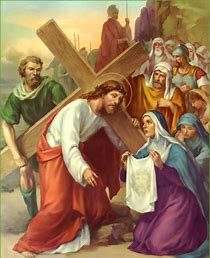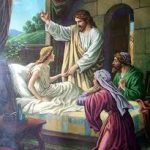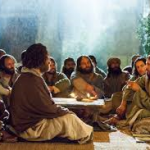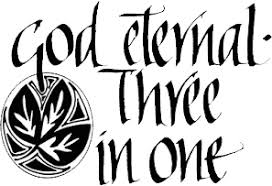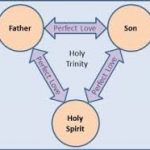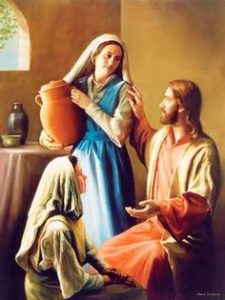 In the Gospel we hear: “as Jesus entered a certain village a woman named Martha welcomed Him into her home…. Mary sat beside the Lord at his feet listening to him speak.” In tomorrow’s first reading from Genesis we have the story of Sarah slaving in the kitchen and Abraham entertaining their three guests: bowing in greeting, sending them to wash up while he scurries about getting a choice steer and giving Sarah orders on what and how to prepare the meal which he alone hosts for his new buddies.
In the Gospel we hear: “as Jesus entered a certain village a woman named Martha welcomed Him into her home…. Mary sat beside the Lord at his feet listening to him speak.” In tomorrow’s first reading from Genesis we have the story of Sarah slaving in the kitchen and Abraham entertaining their three guests: bowing in greeting, sending them to wash up while he scurries about getting a choice steer and giving Sarah orders on what and how to prepare the meal which he alone hosts for his new buddies.
Both Scripture readings (it seems to me) concern more than the contrast between the activists – Martha behind the scene and Abraham busy arranging the details – and the more reticent ladies, Mary and Sarah. The incidents illustrate more than hostesses each doing what they do best to make an evening delightful. There is a bit of all these characters in each of us – one or the other prevails from day to day, and situation to situation.
Jesus’ response to Martha’s “don’t you even care that I am stuck in the kitchen?” reminds us “only one thing is necessary.” It causes us to realize that I, as an individual, do not have to do it all. This is evident in our practice of taking only one role in at a time in the dining room or in a single liturgy – we acknowledge (for instance) that liturgy is a communal act where all present are on the same level: differing in gifts but equal in importance. Everything needs to get done, there are plenty of roles to share: leaders and readers, cooks and servers, singers and keyboardists, prayer leaders and bell ringers, gift bearers and petitioners, Eucharistic ministers and the celebrant. At times our ranks may be slim, especially when members are away or illness prohibits or limits our participation, but we strive to engage everyone in the communal roles.
This is the attitude we strive to express also in the distribution of daily chores. No single person needs to do it all – choices have to be made. Self-importance can creep in the way if I am not careful to realize the impression I make if I try single-handedly to assume the burden of chores failing to ask for assistance. There are times, certainly, when we have to double up on duties but we need to be conscious of enabling others to offer service and to give them the respect of recognizing their capabilities.
The Gospel also gives us a glimpse of Jesus as a gracious guest: the object of Mary’s attentions and the recipient of Martha’s service. Jesus knew his role as servant and the one being served – the contrast between serving and resting gently and securely in the role of being a servant or a guest.
To paraphrase some thoughts from Richard Foster in his book Celebration of Discipline:
There is a difference between choosing to serve and choosing to be a servant (with emphasis on the word CHOOSING). When we chose to serve, we are still in charge. We decide whom we will serve and where we will serve and when we will serve. And if we are in charge, we will worry a great deal about anyone stepping on us, that is taking charge over us.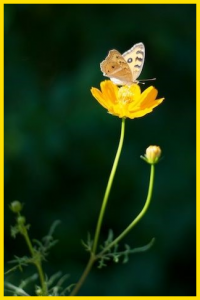
But when we choose to be a servant, we give up the right to be in charge. There is a great freedom in this. When we choose to be a servant, we surrender the right to decide who and where and when we will serve. We become available and vulnerable.
We pray, then, for the grace to have a balance in our lives of being servant (a server) and of being open, receptive, gracious when others render us service – thus enabling them to achieve their God-given calling to serve. We pray that God grant us the grace to be:
- Humble when helpless
- Patient when infirmed
- Gracious when a guest
- Comfortable when the object of service and attention, affection and praise from others
~Reflection by Sister Roberta Bailey, OSB, Prioress

 the Samaritan’s concrete, personal actions teach us that compassion is not a vague feeling – it means to take care of the other even to paying in person.) It means to commit oneself, taking all the necessary steps to ‘come close’ to the other, to the point of identifying oneself with him: “you shall love your neighbor as yourself.”
the Samaritan’s concrete, personal actions teach us that compassion is not a vague feeling – it means to take care of the other even to paying in person.) It means to commit oneself, taking all the necessary steps to ‘come close’ to the other, to the point of identifying oneself with him: “you shall love your neighbor as yourself.”